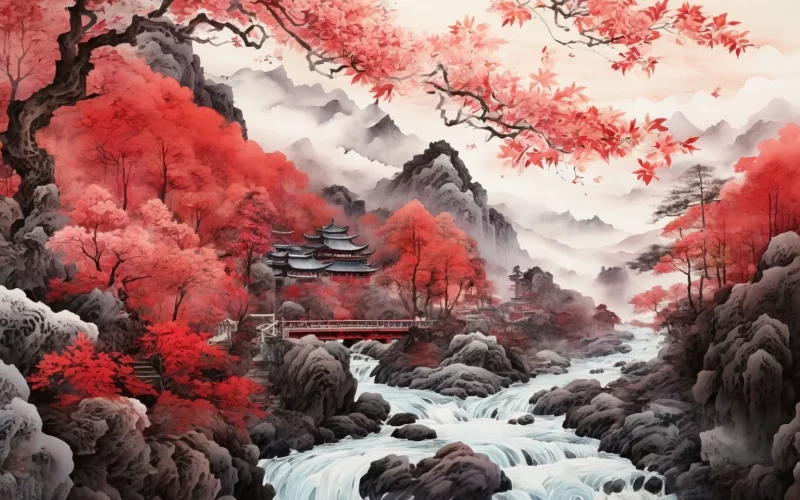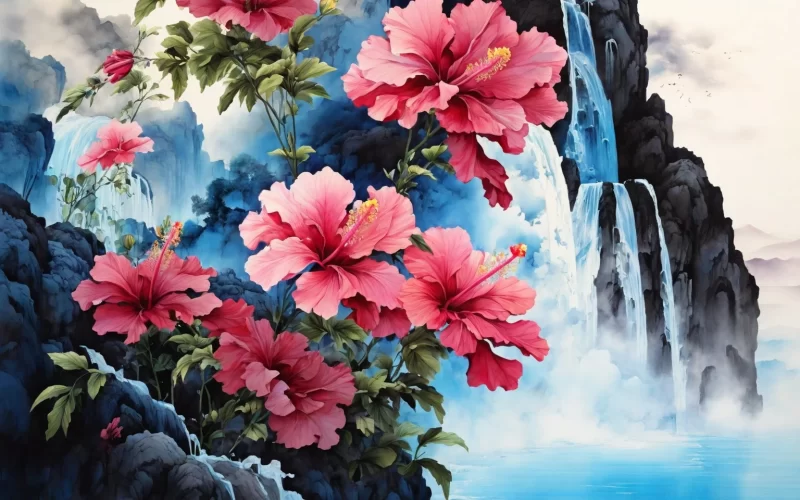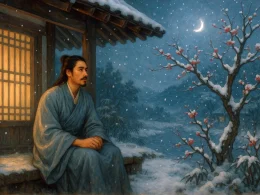White pebbles hear a blue stream glide;
Red leaves are strewn on cold hillside.
Along the path no rain is seen,
My gown is moist with drizzling green.
Original Poem
「山中」
王维
荆溪白石出,天寒红叶稀。
山路元无雨,空翠湿人衣。
Interpretation
Wang Wei achieved remarkable mastery in both landscape painting and poetry, often merging natural scenery with his inner emotions to depict an isolated yet serene mountain life. This poem captures the mountain landscape in early winter through keen observation and profound insight, portraying a tranquil, fresh, and vibrant scene.
First Couplet: "荆溪白石出,天寒红叶稀。"
Jīng xī bái shí chū, tiān hán hóng yè xī.
The Jing Creek reveals pale stones; cold thins the crimson leaves.
The opening line depicts a mountain stream—its clear waters winding around faintly visible white stones, creating an image of pristine beauty. The second line describes sparse red leaves in the waning autumn, their once-vibrant hues fading with the winter chill. These meticulous details illustrate early winter's crisp atmosphere while highlighting nature's quiet transformations.
Second Couplet: "山路元无雨,空翠湿人衣。"
Shān lù yuán wú yǔ, kōng cuì shī rén yī.
No rain falls on the mountain path, yet emerald air dampens my robe.
This couplet conveys the mountain's essence in early winter. Wang Wei paints the lush greenery so vividly that its moisture seems tangible—though no rain has fallen, the verdant hues permeate the air like mist, moistening a traveler's clothes. This sensory imagery blends visual and tactile impressions, showcasing the poet's extraordinary perception of nature.
Holistic Appreciation
Through concise language and delicate brushstrokes, the poem constructs a refreshing winter mountainscape. The initial couplet introduces concrete images ("white stones," "thinned red leaves") to frame the seasonal transition, evoking both clarity and quietude.
The latter couplet animates the scene with atmospheric depth. "Emerald air dampens my robe" immerses readers in the mountain's lingering vitality despite winter's approach. Wang Wei's observation that lush greenery can feel wet without actual rain reveals his deep artistic sensitivity—an ability to capture nature's subtle breath.
By interweaving "water and stone" with "leaf and verdure," the poem layers colors and textures, balancing early winter's serenity with latent vibrancy. Unlike typical bleak winter depictions, Wang Wei's verse thrums with quiet life, merging poetic and pictorial beauty.
Artistic Merits
The poem is concise and refined with strong visual imagery, employing abundant natural elements like clear streams, white stones, red leaves, and mountain paths to make every detail vivid and lively. Particularly the line "the empty emerald moistens one's clothes," through its ingenious combination of visual and tactile senses, demonstrates the poet's delicate perception of mountain scenery. Wang Wei's poetry often emphasizes the connection between nature and the human mind. In this poem, the mountain scenery and the poet's emotions achieve perfect unity, presenting a kind of tranquil and natural beauty.
Insights
Through delicate natural descriptions, this poem provokes profound reflection on natural scenery. In modern society, we are often trapped by noise and disturbances, making it difficult to enjoy the tranquility and purity of nature. This poem reminds us that in our busy lives, occasionally stopping to carefully observe the natural sights around us may help us find inner peace and belonging. It also reminds us that true beauty often exists in subtle details; only by observing with our hearts can we discover the world's authenticity and beauty.
Poem translator
Xu Yuanchong (许渊冲)
About the poet

Wang Wei (王维), 701 - 761 A.D., was a native of Yuncheng, Shanxi Province. Wang Wei was a poet of landscape and idylls. His poems of landscape and idylls, with far-reaching images and mysterious meanings, were widely loved by readers in later generations, but Wang Wei never really became a man of landscape and idylls.












